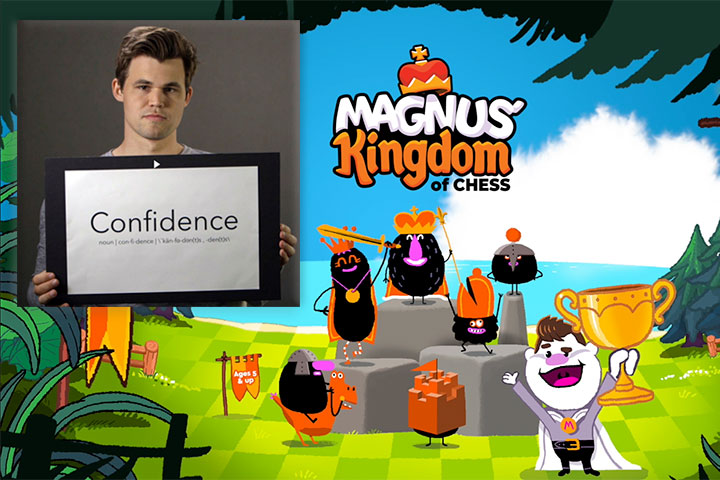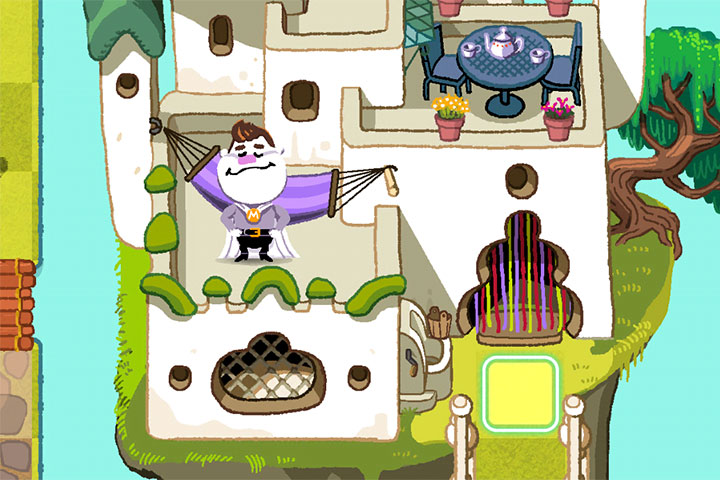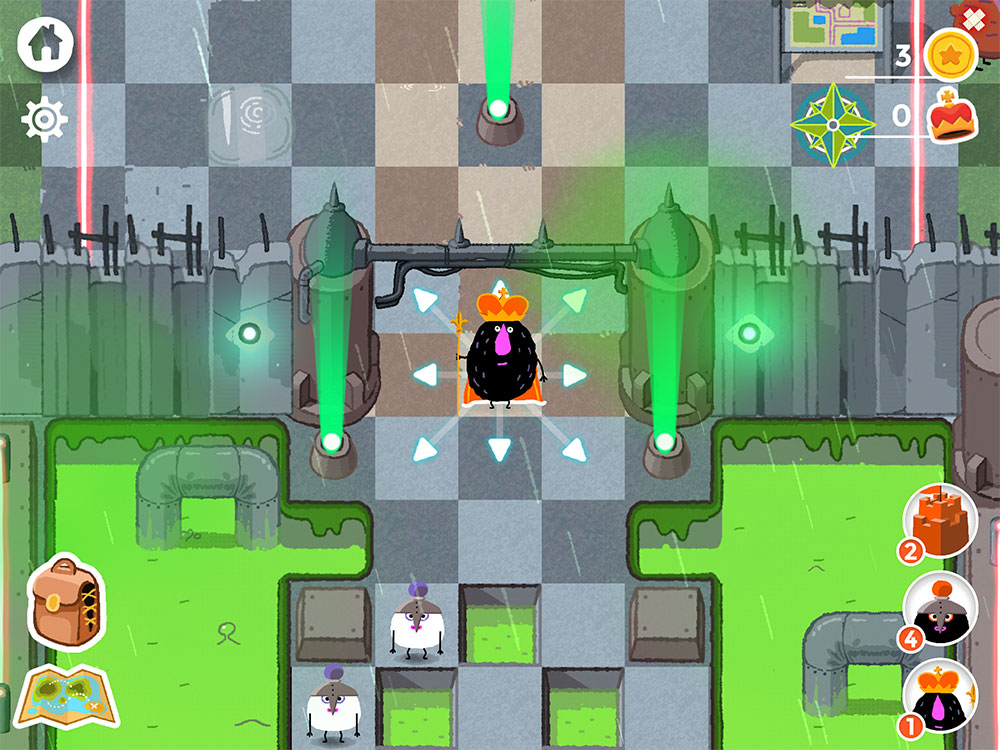


Chess News







Fritz and Chesster - Learn to Play Chess
Learn to think strategically, try out tricky mental exercises and master fun and exciting challenges – all with a generous helping of chess knowledge.
World Champion Magnus Carlsen will have at least one more game with his next title challenger, Fabiano Caruana, before November. He's accepted a wildcard invitation to the Sinquefield Cup, which will take place in St. Louis from August 17th to 28th. But first Carlsen will take on world number's 3 and 6, Shakhriyar Mamedyarov and Maxime Vachier-Lagrave at the ACCENTUS Grandmaster Tournament in Biel from July 21st to August 1st, 2018.
Carlsen has turned down his invitation to the Norwegian Olympiad team (so has Norway's #2 Jon Ludvig Hammer), but he will have one more event (and a potential — though unlikely — game with Caruana) before the World Championship match:
The World Champion Magnus Carlsen returns to Greece & Halkidiki after 10 years to play the European Club Cup. Back in 2008 I was the organiser & we have the unbeatable record(till today) with a total of 85 teams.I predict that in 2018, as ECU nowadys, we will reach the 100 teams! https://t.co/SPesR9yfK0
— Τheodoros Tsorbatzoglou (@teotsorb) June 28, 2018
Jump into chess action, move by move, to rescue Chesster from deep within King Black’s castle. Join Fritz and Bianca in a thrilling chess adventure as they enter rooms of the castle, where each challenge will help you sharpen skills and prepare for the ultimate showdown.
Meanwhile, Play Magnus — the Magnus Carlsen company — is out with a third mobile app, this one target at young children, which also gives us a new (non-Simpsons) take on Magnus, the animated character.

Magnus may have just woken up from a nap in that hammock
The team behind Magnus' Kingdom set out to solve a perennial problem.
There is a huge gap between the fantasy provided by the world of chess (full of knights, queens and battles) and the reality of the game itself (based on rigorous logical thinking where mistakes made during the game are immediately punished). Kids are often very attracted to the beautiful pieces on the chessboard that they may compare to their Legos or Playmobil. Sadly, once they try to play and win, many of them may be suddenly facing a very hard task at hand and even feel disappointed because the initial fantasy faded away so fast.
I've been personally trying it out on my daughter (slightly younger than the target demo), and it definitely seems like a promising way to introduce children to the game from scratch. Absolutely no knowledge of chess is assumed, and initially, you would not even know you were playing a chess game.
When the player starts the game, she is plunged into a room, assuming the role of the black king, with little idea where she is or what she is supposed to do. Pedagogically, this is called "discovery learning". Thanks to some hints, she quickly learns that the king can move one space in any direction, and is able to "capture" small items like a jug which will either contain coins, or something potentially more important, such as a key to a locked door.
Fritz and Chesster - Part 3 Chess for winners
This unforgettable chess adventure is designed to advance young chess player’s skills, move by move. Discover mini-games, brain-twisters and more at every attraction. Pick up chess tips and skills as you ride in bumper cars and the Ferris wheel. Polish up your chess strategy and tactics, opening, middle game and endgame and use what you’ve learned to win. You’ll have lots of fun while you learn more about the serious business of playing – and winning – chess!

Let's go catch some pawns! (Click or tap to expand)
Gradually the pieces are introduced, starting with pawns and rooks. The child is introduced to the idea of being threatened in a very non-threatening way. Your king can be captured but immediately respawns with no consequences. Indeed, while chess is a zero-sum game, in Magnus' Kingdom, you can't lose. We all know how much Magnus hates losing (see the video below for the latest evidence), but for young children, this also makes a lot of sense. The game becomes simply about searching, learning, confronting and overcoming obstacles.
The pedagogical steps are:
With my not-quite-five-year-old, I'm only on step 1, but I look forward to discovering the rest!
My one trivial gripe so far is that the single capturing noise gets repetitive fast — there's no distinction between (e.g.) capturing a jug to get a coin, and capturing a pawn to open the way to win a crown. Since I would be amazed if I'm the only parent with this observation, I've no doubt it will be improved in future app updates.
Had an awesome time with these little champs at the launch of my new kids app last week. We made this game because I believe learning chess is great for young minds. But most importantly, it should be fun. Check it out and let me know what you think! https://t.co/4mxvlA1hQ3
— Magnus Carlsen (@MagnusCarlsen) June 18, 2018
In a nearly three and a half minute video for Inc., Carlsen looks back on his career and reveals that he developed a real sense of confidence in himself and his chess only at the age of 17. Before that, Carlsen says, he often had too much respect for his opponents — and missed many good chances because he did not trust his own rating and often pondered moves too long rather than going with his intuition. As an example, he mentions the game he drew against Garry Kasparov in 2004 as a 13-year-old — which was featured in the documentary about his rise to World Champion, 'Magnus' (2016).
We've transcribed Magnus' quotes below:
Master Class Vol.8: Magnus Carlsen
Scarcely any world champion has managed to captivate chess lovers to the extent Carlsen has. The enormously talented Norwegian hasn't been systematically trained within the structures of a major chess-playing nation such as Russia, the Ukraine or China.
"If you don’t have the ability to make these quick decisions — based on the intuition mostly — confidently, then you will miss out on so many opportunities because you see dangers that aren’t actually real.
'Confidence: A feeling of self-assurance arising from one's appreciation of one's own abilities or qualities.'
I’m Magnus Carlsen. I am from Norway. I’m a chess grandmaster. I’m 27 years old. I’m the number one ranked chess player in the world and the current world champion.
Chess is a very difficult game. It’s very hard often to know whether you’re making the right decision or the right evaluation, but still it’s important to have confidence. Often in chess when you calculate a line, sometimes you miss something, but it turns out later down the road that that was not important and your intuition told you to make a quick confident decision was actually right after all.
I think the first time I started to be really confident in chess was when I was 17 years old. Before that I often had too much respect for my more esteemed colleagues. My game against Kasparov in 2004 when I was 13 is a prime example of my lack of confidence at that time. I spent way way too much time calculating variations that weren’t actually dangerous. Naturally, he was a much much stronger player than I was back then — there was no doubt about that — but in that particular game if I actually believed very seriously that I could beat Kasparov then I probably would have managed. But when I was 16, 17 years old I’d gotten to the level where there was no higher level. I was playing against the best players in the world and I discovered very quickly that in order to not just draw them but to beat them you have to have the belief that you can compete with anybody and that was the first time I really found that, and within a few years, I was completely convinced, rightly or not, that I was the man, that I was the best.
It’s often very difficult when you lose. For me, I just need to somehow be able to strike back. I need to get a win, right after a loss, or a disappointing result because if this bad result lingers then it’s just going to take a lot of time to get your confidence again. I would say that I’ve never been very good at losing. I hate losing and I don’t handle it very well. And I always cope with it by thinking that, yeah I should be better at not losing instead of being better at handling it. So my basic conclusion would be that you have to trust yourself, you have to trust your instincts and your experience accumulated over many years. If you’re not able to do that, you’re not going to go very far. It’s better to trust your gut and be burned sometimes than to always second guess yourself."